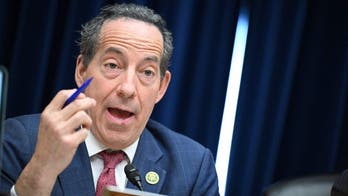"[President Obama’s 2010 health law] is so complicated, and if it isn't done right the first time, it will just simply get worse."
-- Sen. Jay Rockefeller, D-W.Va., at a Tuesday confirmation hearing for Obama’s nominee to lead Medicare and Medicaid. Rockefeller called the law “the most complex piece of legislation ever passed by the United States Congress.”
Democrats defended the decision to push back implementation of most of President Obama’s health law until after his re-election bid on the grounds that the measure was so complex that agencies and states would need years to get ready.
Surely they don’t like being proven right so thoroughly.
Secretary of Health and Human Services Kathleen Sebelius in a speech at Harvard on Monday vented her frustrations with implementing the massive law that, aside from creating a new health-insurance entitlement program, has spawned tens of thousands of pages of regulations on everything from tax collection to the sale of salami sandwiches at supermarkets.
Sebelius expressed surprising surprise that the same state governors and lawmakers who fought the law all the way to the Supreme Court had not continued to resist the provisions they found expensive or onerous.
Remember that to hold down the federal cost of the law while still offering something like “universal coverage,” Congress dumped much of the expense for expanded coverage on states by expanding what had formerly been a program for impoverished Americans into the middle class. Sebelius said the expectation in the administration was that the opponents would rally ‘round the law and speed its implementation once the high court had ruled.
If that’s true, it represents an alarming lack of perception of politics and human nature. If it is an exaggeration, though, it represents an early effort by Team Obama to fix blame for missed expectations of the still-unpopular law on Republicans.
Sebelius came before the House today to seek another $1.5 billion to implement the much-beleaguered law. Implicit in her budget request is the warning that if Republicans do not provide additional funds to impose the law they hate, the failure of the law would be on their heads.
We see this week, then, the beginning of the Democratic strategy for dealing with the law, and health care in general, ahead of the 2014 elections: Yes, it stinks, but only because Republicans wouldn’t help implement it.
Now, from a practical point of view one could argue that the Republican resistance was a function of Obama’s decision to go it alone on the health law. Rather than passing a still-more-watered down version of his promised health law with some Republican support, impatient Obama went to ramming speed.
Had Obama crafted a less audacious law to earn bipartisan support, Republican opposition would have been more muted and implementation would have been a much easier task.
It is not surprising, however, that Team Obama would seek to pin problems with the health law on his political adversaries. That has been the president’s approach on the economy, arguing that his stimulus measures of his first two years were undone by the refusal of Republicans to enact still more stimuli.
There’s little evidence that his argument on the economy has worked. Obama focused his re-election bid on character attacks against the Republican nominee, allowing the president to win the election without gaining public approval for his economic policies. And Americans increasingly believe that less government spending, not the increases sought by the president, are the path to prosperity.
But giving the coming collision with what the president took to calling “Obamacare,” Democrats are in need of an answer to the rising problems with the law. The president is safe from voters, but Democrats will be running for re-election just as the painful parts kick in.
And why wouldn’t Republicans cling to the belief that Obama’s law could be repealed or substantially remade. Two of the president’s main allies in enacting the law – the insurance industry and Senate Democrats – are already nicking away at Obama’s legacy project.
By opting to rely on the insurance industry to deliver subsidized benefits, rather than using a government-run insurance program Obama once sought, the president has made his law captive to the industry.
As premiums soar due to new regulations, the number of Americans who will be dumped into government programs is soaring too. Facing such massive disruptions in an election year is bad news for Democrats, and they are therefore quite willing to hear from industry honchos who seek delays and exemptions to hold down costs.
It was once thought that the government could hold down premiums through force by refusing increases. But while the Supreme Court may have ruled that the government can force you to buy insurance, but no one has said so far that anyone has to sell it. If profits vanish, so too will Obama’s partners in expanded coverage.
Meantime, special-interest groups harmed by the law – manufacturers of medical devices, hospitals, doctors, small businesses and others – are keeping up the pressure for changes to the law that would make it less generous, more unaffordable and harder still to implement.
Like the Republican governors and lawmakers whose resistance Sebelius blames for the haywire implementation of the law, the lobbyists haven’t given up either. And they never will.
But whomever Team Obama wants to blame for the growing list of problems with the law, voters will always remember whose “big [expletive] deal” this is.
And Now, A Word From Charles
“The fact that [the murder trial of a Philadelphia abortionist charged with killing seven infants born alive] is not covered, I think is easily explained. It puts the pro-abortion forces in a very bad light. It brings the issue of late-term abortion starkly into relief.”
-- Charles Krauthammer on “Special Report with Bret Baier.”
Chris Stirewalt is digital politics editor for Fox News, and his POWER PLAY column appears Monday-Friday on FoxNews.com. Catch Chris Live online daily at 11:30amET at http:live.foxnews.com.




